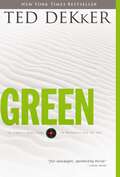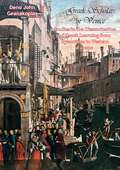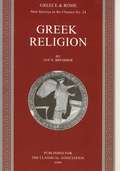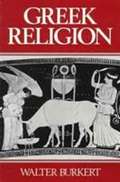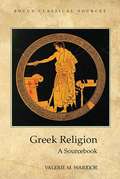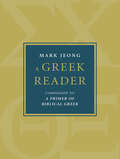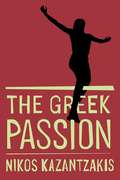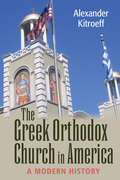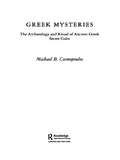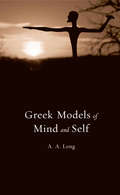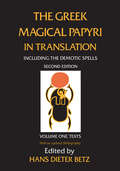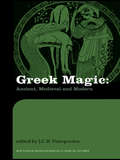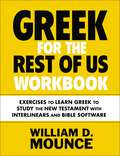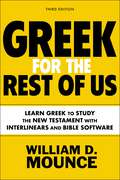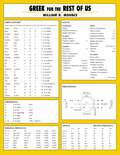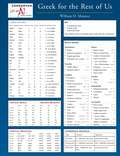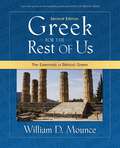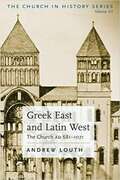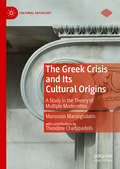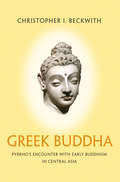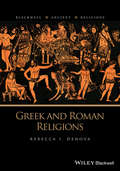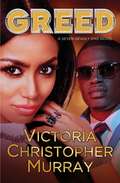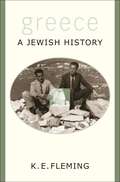- Table View
- List View
Green: Includes Alternate Ending (Circle #4)
by Ted DekkerExperience Green with the author's original ending--plus an alternate conclusion to the epic Circle Series.<P> As foretold by ancient prophets, an apocalypse destroyed Earth during the twenty-first century. But two thousand years later, Elyon set upon the earth a new Adam. This time, however, he gave humanity an advantage. What was once unseen became seen. It was good and it was called . . . Green.<P> The evil Teeleh bided his time in a Black Forest. When least expected, a twenty-four-year-old named Thomas Hunter fell asleep in our world and woke up in that Black Forest. A gateway was opened for Teeleh to ravage the land beyond--and the inhabitants of the Circle. Devastated by the ruin, Thomas Hunter and his Forest Guard swore to fight the dark scourge until their dying breath.<P> That was a long time ago. Now the Circle has lost all hope. And Samuel, Thomas Hunter's cherished son, has turned his back on his father. Samuel is aligning with Teeleh's forces to wage the final war. Thomas is crushed, but he's determined to rescue the Circle--and his son--even if he has to cross two worlds to do so.
Greek Scholars in Venice
by Deno John GeanakoplosTHE MOVEMENT which more than any other served to widen the intellectual horizon of western Europe during the later Middle Ages and the Renaissance was the restoration of Greek letters. In the history of this revival a significant role was played by the Greek scholar-exiles from the Byzantine, or former Byzantine, areas of the East. Beginning in the late fourteenth century and extending well into the sixteenth, a more or less steadily increasing flow of refugees or voluntary exiles from the Greek East—a veritable diaspora—seeking to escape the Turkish domination of their homelands, poured into the West. Many of these émigrés were well educated in the Greek language and literature, and through their work of teaching, manuscript copying, and preparing of texts for the press contributed materially to the advancement of Greek studies in western Europe.Of these exiles the more prominent ones—Chrysoloras, Bessarion, Gaza, Trapezuntios, Argyropoulos, Callistos, Chalcondyles, and Janus Lascaris—have already been the object of considerable attention. But there are scores of others whose careers, less spectacular but perhaps more typical of the experience of the average refugee humanist, have not yet been closely investigated. This book is primarily concerned with the lives of several of these lesser-known figures whose careers are closely associated with the city of Venice in the period of the Renaissance when she attained the primacy in the study of Greek.
Greek Religion (New Surveys In The Classics #24)
by Jan N. BremmerIn this brief but highly informative book Jan Bremmer presents an outline of Greek religion in the classical period. After a survey of its main characteristics, he offers a clear and innovative view of the great gods and heroes as well as their sanctuaries and also the main myths, rituals and mysteries: from Athena to Zeus, from sacrifice to the puritan Orphics, from the Indo-European roots to the influence of the ancient Near East. The approach pays attention to the sociological, anthropological and psychological aspects of Greek religion and also to the gender roles. By analyzing the often modern origin of many of the notions employed in the analysis of Greek religion, it also shows the difference between the polytheism of the Greeks and the place of religion in modern Western society. Its excellent bibliography makes this book a very useful tool for students and teachers alike.
Greek Religion
by Walter Burkert John RaffanIn this book Walter Burkert, the most eminent living historian of ancient Greek religion, has produced the standard work for our time on that subject. First published in German in 1977, it has now been translated into English with the assistance of the author himself. A clearly structured and readable survey for students and scholars, it will be welcomed as the best modern account of any polytheistic religious system. Burkert draws on archaeological discoveries, insights from other disciplines, and inscriptions in Linear B to reconstruct the practices and beliefs of the Minoanâe"Mycenaean age. The major part of his book is devoted to the archaic and classical epochs. He describes the various rituals of sacrifice and libation and explains Greek beliefs about purification. He investigates the inspiration behind the great temples at Olympia, Delphi, Delos, and the Acropolisâe"discussing the priesthood, sanctuary, and oracles. Considerable attention is given to the individual gods, the position of the heroes, and beliefs about the afterlife. The different festivals are used to illuminate the place of religion in the society of the city-state. The mystery cults, at Eleusis and among the followers of Bacchus and Orpheus, are also set in that context. The book concludes with an assessment of the great classical philosophersâe(tm) attitudes to religion. Insofar as possible, Burkert lets the evidenceâe"from literature and legend, vase paintings and archaeologyâe"speak for itself; he elucidates the controversies surrounding its interpretation without glossing over the enigmas that remain. Throughout, the notes (updated for the English-language edition) afford a wealth of further references as the text builds up its coherent picture of what is known of the religion of ancient Greece.
Greek Religion (Focus Classical Sources)
by Valerie M. WarriorGreek Religion: A Sourcebook provides an introduction to the fundamentals of ancient Greek religious beliefs and rituals through a rich collection of ancient source readings. The translations draw from the Focus Classical Library sources as well as new translations by the author and other outstanding scholars. Chapters cover such topics as ancient magic, mystery cults, divination, and festivals. Illustrated throughout with photos and maps, this book is designed as a companion to Valerie Warrior’s Roman Religion: A Sourcebook.
A Greek Reader: Companion to A Primer of Biblical Greek (Eerdmans Language Resources)
by Mark JeongA companion resource for use with N. Clayton Croy&’s Primer of Biblical Greek, featuring dozens of simple, enjoyable narratives to reinforce the content and skills introduced by Croy. Too often, Greek readers include difficult primary texts encumbered with glosses, but this reader from Mark Jeong is instead comprised of originally written texts keyed to the vocabulary and grammar taught in Clayton Croy&’s Primer of Biblical Greek. Thus fluent, comprehensive reading—rather than painstaking translation—can be the goal. In addition to providing useful practice, Jeong&’s engaging narratives will help students of Greek grasp the nuances of particularly complicated aspects of Koine—such as the imperfect tense—by allowing them to see the language &“in action&” in various textual situations. Each narrative also follows a larger story about the adventures of Philemon, Onesimus, and Paul, making for enjoyable reading that better prepares one for the daunting task of eventually reading the Greek New Testament.
Greek Passion
by Nikos KazantzakisLike his The Last Temptation of Christ, literary master Nikos Kazantzakis's The Greek Passion is a daring exploration of the pitfalls of a religion as it is practiced by its all-too-human followers. The tiny Greek village of Lycovrisi is planning its annual Passion play when its customary tranquility is ruptured by the arrival of a group of starved refugees from a village destroyed by the Turks. The refugees, led by a righteous priest named Father Fotis, beg for assistance from the villagers of Lycovrisi, but are turned away by the domineering village elders, who each have their particular reasons for refusing to help. As tensions grow among the villagers of Lycovrisi, their elders, and the outsiders, each person in turn will be forced to reckon with his sins and seek his own path to salvation.
The Greek Orthodox Church in America: A Modern History (NIU Series in Orthodox Christian Studies)
by Alexander KitroeffIn this sweeping history, Alexander Kitroeff shows how the Greek Orthodox Church in America has functioned as much more than a religious institution, becoming the focal point in the lives of the country's million-plus Greek immigrants and their descendants. Assuming the responsibility of running Greek-language schools and encouraging local parishes to engage in cultural and social activities, the church became the most important Greek American institution and shaped the identity of Greeks in the United States. <P><P> Kitroeff digs into these traditional activities, highlighting the American church's dependency on the "mother church," the Greek Orthodox Patriarchate of Constantinople, and the use of Greek language in the Sunday liturgy. Today, as this rich biography of the church shows us, Greek Orthodoxy remains in between the Old World and the New, both Greek and American.
Greek Mysteries: The Archaeology of Ancient Greek Secret Cults
by Michael B. CosmopoulosWritten by an international team of acknowledged experts, this excellent book studies a wide range of contributions and showcases new research on the archaeology, ritual and history of Greek mystery cults. With a lack of written evidence that exists for the mysteries, archaeology has proved central to explaining their significance and this volume is key to understanding a phenomenon central to Greek religion and society.
Greek Models of Mind and Self
by A. A. LongAn authoritative treatment of Greek modes of self-understanding, Greek Models of Mind and Self demonstrates how ancient thinkers grappled with what is closest to us and yet still most mysterious―our own essence as singular human selves―and how the study of Greek thought can enlarge and enrich our experience.
The Greek Magical Papyri in Translation, Including the Demotic Spells, Volume 1
by Hans Dieter Betz"The Greek magical papyri" is a collection of magical spells and formulas, hymns, and rituals from Greco-Roman Egypt, dating from the second century B.C. to the fifth century A.D. Containing a fresh translation of the Greek papyri, as well as Coptic and Demotic texts, this new translation has been brought up to date and is now the most comprehensive collection of this literature, and the first ever in English. The Greek Magical Papyri in Transition is an invaluable resource for scholars in a wide variety of fields, from the history of religions to the classical languages and literatures, and it will fascinate those with a general interest in the occult and the history of magic. "One of the major achievements of classical and related scholarship over the last decade."—Ioan P. Culianu, Journal for the Study of Judaism "The enormous value of this new volume lies in the fact that these texts will now be available to a much wider audience of readers, including historians or religion, anthropologists, and psychologists."—John G. Gager, Journal of Religion "[This book] shows care, skill and zest. . . . Any worker in the field will welcome this sterling performance."—Peter Parsons, Times Literary Supplement
The Greek Magical Papyri in Translation, Including the Demotic Spells, Volume 1
by Hans Dieter Betz"The Greek magical papyri" is a collection of magical spells and formulas, hymns, and rituals from Greco-Roman Egypt, dating from the second century B.C. to the fifth century A.D. Containing a fresh translation of the Greek papyri, as well as Coptic and Demotic texts, this new translation has been brought up to date and is now the most comprehensive collection of this literature, and the first ever in English. The Greek Magical Papyri in Transition is an invaluable resource for scholars in a wide variety of fields, from the history of religions to the classical languages and literatures, and it will fascinate those with a general interest in the occult and the history of magic. "One of the major achievements of classical and related scholarship over the last decade."—Ioan P. Culianu, Journal for the Study of Judaism "The enormous value of this new volume lies in the fact that these texts will now be available to a much wider audience of readers, including historians or religion, anthropologists, and psychologists."—John G. Gager, Journal of Religion "[This book] shows care, skill and zest. . . . Any worker in the field will welcome this sterling performance."—Peter Parsons, Times Literary Supplement
Greek Magic: Ancient, Medieval and Modern (Routledge Monographs in Classical Studies)
by J.C.B. PetropoulosMagic has always been a widespread phenomenon in Greek Society, starting from Homer’s Circe (the first ‘evil witch’ in western history) and extending to the pervasive belief in the ‘evil eye’ in the twenty-first century Greece. Indeed, magic is probably the most ancient and durable among social and religious phenomena known to classical and other scholars, and it can be traced over a span of some three millennia in sources in the Greek language as well as in an impressive range of visual and other media. For instance, curse tablets from fourth-century B.C. Athens, the medico-magical gems of late antiquity, early Christian amulets, and various exorcism prayers from the medieval and later periods. Organised chronologically, the intriguing panorama offered by this book guides the reader through the ancient, medieval, modern and even contemporary periods, highlighting the traditions, ideologies and methods of magic in each period of Greek history. It brings together the latest insights from a range of experts from various disciplines: classicists, art historians, archaeologists, legal historians and social anthropologists amongst others.
Greek for the Rest of Us Workbook: Exercises to Learn Greek to Study the New Testament with Interlinears and Bible Software
by William D. MounceA WORKBOOK to Help You Learn the Essentials of Biblical Greek So You Can Study the New Testament More DeeplyThe Greek for the Rest of Us Workbook is a companion to Greek for the Rest of Us, Third Edition (sold separately) by William D. Mounce. This workbook provides exercises to help readers practice and review, so they learn the essentials of biblical Greek more effectively and can study the New Testament more deeply.Greek for the Rest of Us, Third Edition is crash-course on "Greek for the rest of us" that acquaints the reader with the essentials of the language so they can study the New Testament more deeply. Readers will gain a sound knowledge of the fundamentals of Greek and learn how to use tools that will add muscle to their Bible studies.Readers using the Greek for the Rest of Us Workbook in conjunction with Greek for the Rest of Us, Third Edition will learn to:Read and pronounce Greek wordsLearn the fundamentals of the Greek noun and verb systemConduct effective Greek word studiesLearn the basics of Greek exegesis for biblical interpretationUnderstand why translations are different Read better commentariesBe comfortable using reverse and traditional interlinearsUnderstand the information displayed by biblical softwareThe Greek for the Rest Us Workbook will enhance your learning experience with exercises to help you practice and reinforce the concepts you are learning in Greek for the Rest of Us, Third Edition.
Greek for the Rest of Us, Third Edition: Learn Greek to Study the New Testament with Interlinears and Bible Software
by William D. MounceLearn the Essentials of Biblical Greek So You Can Study the New Testament More DeeplyThis newly revised third edition of Greek for the Rest of Us by Greek instructor William Mounce is crash-course on "Greek for the rest of us" that acquaints the reader with the essentials of the language so they can study the New Testament more deeply. Readers will gain a sound knowledge of the fundamentals of Greek and learn how to use tools that will add muscle to their Bible studies.In Greek for the Rest of Us readers will learn to:Read and pronounce Greek wordsLearn the fundamentals of the Greek noun and verb systemConduct effective Greek word studiesLearn the basics of Greek exegesis for biblical interpretationUnderstand why translations are differentRead better commentariesBe comfortable using reverse and traditional interlinearsUnderstand the information displayed by biblical softwareFor anyone interested in seriously studying the New Testament, Greek for the Rest of Us is your gateway to learning the skills and tools you need to accomplish your goals. You can enhance your learning experience even more with the Greek for the Rest Us Workbook (sold separately) which contains exercises to help practice and reinforce the concepts you are learning in the main book.
Greek for the Rest of Us Laminated Sheet: Learn Greek to Study the New Testament
by William D. MounceThe Greek for the Rest of Us Laminated Sheet is a handy, at-a-glance study aid, ideal for last minute review, a quick overview of grammar, or as an aid in Bible study. The laminated sheet is a companion resource for Greek for the Rest of Us, Third Edition (sold separately) by William Mounce and is a critical part of acquainting readers with the essentials of the language and deepening their understanding of God's Word.When used in conjunction with Greek for the Rest of Us, Third Edition this laminated study sheet will help readers:Read and pronounce Greek wordsLearn the fundamentals of the Greek noun and verb systemConduct effective Greek word studiesLearn the basics of Greek exegesis for biblical interpretationUnderstand why translations are differentRead better commentariesBe comfortable using reverse and traditional interlinearsUnderstand the information displayed by biblical software
Greek for the Rest of Us Laminated Sheet: The Essentials Of Biblical Greek
by William D. MounceMany people want to learn Greek in order to better understand the Bible, but very few are able to spend the numerous years required to master Biblical Greek, even those who have a seminary education.The get-an-A laminated sheet for Greek for the Rest of Us by William Mounce is a critical part of acquainting students with the essentials of the language and deepening their understanding of God’s Word.Developed by renowned Greek teacher William Mounce, this Greek for the Rest of Us Laminated Sheet will help students: recite the Greek alphabet; read and pronounce Greek words; learn the Greek noun and verbal system; conduct Greek word studies; decipher why translations are different; see the author’s flow of thought and central message; and read better commentaries.
Greek for the Rest of Us: The Essentials of Biblical Greek
by William D. MounceIf you’d love to learn Greek so you can study your Bible better, then this newly revised second edition of Greek for the Rest of Us is foryou. Developed by renowned Greek teacher William Mounce, this revolutionarycrash-course on “Greek for the rest of us” will acquaint you with the essentials of the language and deepen your understanding of God’s Word. You’ll gain a sound knowledge of Greek, and you’ll learn how to use tools that will add muscle to your Bible studies. This book is divided into three major sections (Foundational Greek, Church Greek, and Functional Greek), each of which builds on the previous section and takes you to the next level. Depending on which levels you take, the book will teach you how to: Read and pronounce Greek words Learn the fundamentals of the Greek noun and verb system Conduct effective Greek word studies Learn the basics of Greek exegesis for biblical interpretation Decipher why translations are different Read better commentaries Be comfortable using reverse and traditional interlinears Understand the information displayed by biblical software
Greek East and Latin West: The Church AD 681-1071
by Andrew LouthThis volume gives an account of the Church in the period from the end of the Sixth Ecumenical Synod in 681 to the Battle of Manzikert in 1071. <p><p> Although 'Greek East' and 'Latin West' are becoming distinct entities during this expanse of time, the author treats them in parallel, observing the points at which their destinies coincide or conflict and noting developments within the whole of the Church rather than striving simply, or even primarily, to explain the eventual schism between Eastern and Western Christendom. <p><p> Covering events both unique to each part (the Iconoclastic controversy in the East and the rise of the Carolingian Empire in the West) and common to each part (monastic reform, renaissance, and mission) the author skillfully portrays two Christian civilizations that share much in common yet become increasingly incomprehensible to one another. <p><p> Despite curious synchronisms between East and West, the author demonstrates how two paths diverged from a once common route, and how eventually Byzantine Orthodoxy defined the Greek East over against the Latin West in theological, religious, cultural, and political terms.
The Greek Crisis and Its Cultural Origins: A Study in the Theory of Multiple Modernities (Cultural Sociology)
by Manussos MarangudakisThis original analysis of modern Greece’s political culture attempts to present a “total social fact”—a coherent and complex representation of Greek socio-political culture—to identify the cultural causes of Greece’s recent disastrous economic crisis. Using a culturalist frame inspired by the Yale Strong Program, Marangudakis argues that the core cultural orientations of Greece have determined its politics—Greek secular culture flows out of the religion of Eastern Orthodoxy with its mysticism, icons, and general “ortherworldly-nesses.” This theoretical discussion, bringing together Eisenstadt, Michael Mann, Banfield, and Taylor, is complemented by an innovative use of survey data, processed by political scientist and statistician Theodore Chadjipadelis. The carefully deployed quantitative data demonstrate that the culture previously described is actually shared by people living in Greece today. In his sweeping conclusion to this thorough cultural analysis, Marangudakis reflects on the prospects of Greek cultural recovery through the construction of a non-populist civil religion.
Greek Buddha
by Christopher I. BeckwithPyrrho of Elis accompanied Alexander the Great to Central Asia and India during the Graeco-Macedonian invasion and conquest of the Persian Empire in 334-324 BC, and while there met with teachers of Early Buddhism. Greek Buddha shows how Buddhism shaped the philosophy of Pyrrho, the famous founder of Pyrrhonian scepticism in ancient Greece. Identifying Pyrrho's basic teachings with those of Early Buddhism, Christopher I. Beckwith traces the origins of a major tradition in Greek philosophy to Gandhāra, a country in Central Asia and northwestern India.Using a range of primary sources, he systematically looks at the teachings and practices of Pyrrho and of Early Buddhism, including those preserved in testimonies by and about Pyrrho, in the report on Indian philosophy two decades later by the Seleucid ambassador Megasthenes, in the first-person edicts by the Indian king Devānāṃpriya Priyadarśi referring to a popular variety of the Dharma in the early third century BC, and in Taoist echoes of Gautama's Dharma in Warring States China. Beckwith demonstrates how the teachings of Pyrrho agree closely with those of the Buddha śākyamuni, "the Scythian Sage." In the process, he identifies eight distinct attested philosophical schools in ancient northwestern India and Central Asia, including Early Zoroastrianism, Early Brahmanism, and several forms of Early Buddhism. Beckwith then shows the influence that Pyrrho's brand of scepticism had on the evolution of Western thought, first in Antiquity, and later, during the Enlightenment, on the great philosopher and self-proclaimed Pyrrhonian, David Hume.Greek Buddha demonstrates that through Pyrrho, Early Buddhist thought had a significant impact on Western philosophy.
Greek and Roman Religions (Blackwell Ancient Religions)
by Rebecca I. DenovaOffers an introduction to the basic beliefs, practices, and major deities of Greek and Roman religions A volume in the Blackwell Ancient Religions, Greek and Roman Religions offers an authoritative overview of the region’s ancient religious practices. The author—a noted expert in the field—explores the presence of divinity in all aspects of ancient life and highlights the origins of myth, religious authority, institutions, beliefs, rituals, sacred texts, and ethics. Comprehensive in scope, the text focuses on myriad aspects that constitute Greco-Roman culture such as economic class, honor and shame, and slavery as well as the religious role of each member of the family. The integration of ethnic and community identity with divine elements are highlighted in descriptions of religious festivals. Greek and Roman Religions presents the evolution of ideas concerning death and the afterlife and the relation of death to concepts of ultimate justice. The author also offers insight into the elements of ancient religions that remain important in our contemporary quest for meaning. This vital text: Offers a comprehensive review of ancient Greek and Roman religions and their institutions, beliefs, rituals, and more Examines how the Roman culture and religions borrowed from the Greek traditions Explores the ancient civilizations of the Mediterranean Basin Contains suggestions at the end of each chapter for further reading that include both traditional studies and more recent examinations of topical issues Written for students of ancient religions and religious studies, this important resource provides an overview of the ancient culture and history of the general region as well as the basic background of Greek and Roman civilizations.
Greek and Roman Animal Sacrifice
by F. S. Naiden Christopher A. FaraoneThe interpretation of animal sacrifice, now considered the most important ancient Greek and Roman religious ritual, has long been dominated by the views of Walter Burkert, the late J.-P. Vernant, and Marcel Detienne. No penetrating and general critique of their views has appeared and, in particular, no critique of the application of these views to Roman religion. Nor has any critique dealt with the use of literary and visual sources by these writers. This book, a collection of essays by leading scholars, incorporates all these subjects and provides a theoretical background for the study of animal sacrifice in an ancient context.
Greed: A Seven Deadly Sins Novel (Seven Deadly Sins #3)
by Victoria Christopher MurrayPassion, money, and a deliciously devious twist: Greed is the newest novel in award-winning author Victoria Christopher Murray’s Seven Deadly Sins series—“the drama of The Real Housewives of Beverly Hills” (Booklist)—and soon to be a Lifetime movie.You can’t put a price on love… Zuri Maxwell isn’t happy. Her job is a grind, and money is always tight. Her boyfriend Stephon is the best part of life, but between his income as an artist and her commission-based paycheck, they are barely scraping by. When Zuri meets a sleek entrepreneur eager to pick her brain, she jumps at the chance to talk business with someone who has everything she wants. As he wines and dines her, Zuri starts moving in elite circles, and she faces a crossroads: Will she give up the stable, loving life she knows for one that glitters, but may not be gold?
Greece--a Jewish History
by K. E. FlemingK. E. Fleming's Greece--a Jewish History is the first comprehensive English-language history of Greek Jews, and the only history that includes material on their diaspora in Israel and the United States. The book tells the story of a people who for the most part no longer exist and whose identity is a paradox in that it wasn't fully formed until after most Greek Jews had emigrated or been deported and killed by the Nazis. For centuries, Jews lived in areas that are now part of Greece. But Greek Jews as a nationalized group existed in substantial number only for a few short decades--from the Balkan Wars (1912-13) until the Holocaust, in which more than 80 percent were killed. Greece--a Jewish History describes their diverse histories and the processes that worked to make them emerge as a Greek collective. It also follows Jews as they left Greece--as deportees to Auschwitz or émigrés to Palestine/Israel and New York's Lower East Side. In such foreign settings their Greekness was emphasized as it never was in Greece, where Orthodox Christianity traditionally defines national identity and anti-Semitism remains common.
